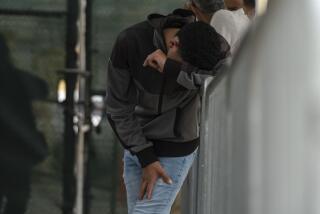U.S. Troops Leave for Cuba to Set Up Afghan War Prison
- Share via
WASHINGTON — The first of about 1,500 U.S. troops began heading for the U.S. Navy base at Guantanamo Bay, Cuba, on Sunday to build and then protect a maximum-security prison for up to 2,000 Al Qaeda and Taliban prisoners from Afghanistan, the Pentagon said.
An initial group of prisoners--fewer than 100--will be transported to the new prison within the next 10 days. The largest share of the U.S. troops will be military police from Ft. Hood, Texas, according to Lt. Col. Dan Stoneking, a Pentagon spokesman.
The troop movement came as U.S. and local forces in Afghanistan continued their hunt for Osama bin Laden, Taliban leader Mullah Mohammed Omar and other top officials of the Al Qaeda network and the deposed Afghan regime.
The government of Uzbekistan, on the northern Afghan border, told a delegation of U.S. senators touring the Central Asian region that its intelligence service now believes the Saudi militant has slipped out of Afghanistan, according to Sen. John Edwards (D-N.C.).
The presence of Bin Laden and his entourage in Pakistan would put pressure on President Pervez Musharraf, who is struggling to deal with crises both on his nation’s border with Afghanistan and along a volatile frontier with India.
“I fully expect the Pakistanis will do everything they can to help us locate Bin Laden,” Edwards said on “Fox News Sunday.”
In Afghanistan, where he was visiting an orphanage in the capital, Kabul, interim Prime Minister Hamid Karzai said he had no knowledge of Omar’s whereabouts.
Replying to reporters’ questions, Karzai said: “We are looking for him. We will arrest him.”
U.S. planes flew constantly over southeastern Afghanistan on Sunday afternoon and could easily be heard and seen as they traversed the skies. The Pakistan-based Afghan Islamic Press said U.S. aircraft had bombed targets in eastern Afghanistan’s Spinghar mountain range near the Pakistani border during the night, flying at least six sorties, but the report could not be independently confirmed.
The jets were believed to be targeting suspected members of Al Qaeda, some of whom are thought to remain at large in southeastern Afghanistan.
On the outskirts of Kabul, some distance away, a contingent of the first international peacekeeping troops to arrive in the capital was starting repair work on Kabul International Airport. French troops were removing land mines in preparation for repairing the runway and other areas so that the facility can once again receive flights.
Currently, the only planes flying into the Kabul area land in Bagram, about 35 miles to the north.
At the moment, the U.S. military is holding more than 300 Taliban or Al Qaeda members, the vast majority at a base near the airport in the southern city of Kandahar. Others are being held on the amphibious assault ship Bataan in the Arabian Sea, at the Bagram air base and in the northern city of Mazar-i-Sharif.
Among those being held on the Bataan are John Walker Lindh, the 20-year-old Californian who fought with the Taliban. On Sunday, Ibn Al-Shaykh al-Libi, who helped run Bin Laden’s terrorist training camps in Afghanistan and who was turned over to the U.S. last week by Pakistan, was expected to be taken to the ship soon.
The new facility in Cuba will take special precautions in holding the detainees in light of difficulties that have arisen in confining prisoners in Afghanistan. In Mazar-i-Sharif, a prison uprising led to the death on Nov. 25 of CIA officer Johnny “Mike” Spann, the first American to be killed by the enemy in Afghanistan, and of dozens of Afghans.
“Many of these people have demonstrated their determination to kill others, kill themselves or escape, and we’re using the necessary amounts of constraints in order to build appropriate facilities for these detainees,” said Lt. Cmdr. Jeff Davis, a Pentagon spokesman. “We are cognizant of the incident that took place in Mazar-i-Sharif.”
But U.S. officials also said that the prison standards will conform with international conventions and that the Red Cross will have access to all those held on the 45-square-mile base at Guantanamo Bay.
“Their treatment and their detention will be humane,” Davis said.
*
Times staff writer Alissa J. Rubin Kabul contributed to this report.
More to Read
Sign up for Essential California
The most important California stories and recommendations in your inbox every morning.
You may occasionally receive promotional content from the Los Angeles Times.










